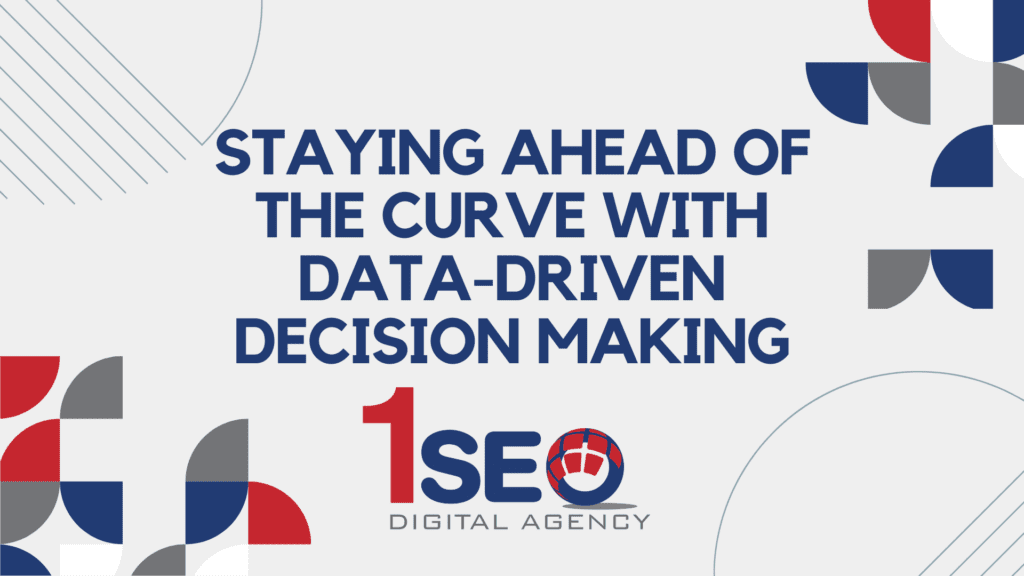Speak To An Expert Now: 215-946-1046

How Local SEO Drives More Leads for Home Services
Do you struggle to generate quality leads for your home service business? This post explains how local SEO can improve online visibility and drive more

Do you want to ensure your business stays ahead of the competition in today’s fast-paced digital world? Data-driven decision-making is the best way to keep up with changing trends and quickly identify growth opportunities.
At 1SEO Digital Agency, we believe in making well-informed decisions by leveraging first-hand knowledge of your target audience and utilizing real data insights. Please find out how to create a competitive edge using our tips on staying ahead of the curve with data-driven decision-making.
The first step in creating a data-driven strategy is to define your goals. Next, knowing which key performance indicators (KPIs) you want to measure and track will help you focus on what matters most for your business. For example, determining website traffic, customer acquisition rate, or total revenue generated would best measure your success. Once you have set your objectives, you can focus on understanding your audience better.
Understanding the needs of your target audience is crucial to stay competitive. You can use data sources like Google Analytics or Adobe Analytics to gain valuable insights about your website visitors and find patterns. Demographic reports can also be helpful in understanding who your audience is and what they are looking for. With this information, our search engine optimization team can help you make informed decisions on reaching them best and driving conversions.
Predictive analytics can be the perfect tool to help businesses stay ahead of the curve and make informed decisions with data-driven decision-making. By using predictive analytics, companies can draw conclusions from past data, identify trends and make predictions based on those trends. In addition, predictive analytics allows businesses to anticipate customer behavior, understand their target market’s needs, and plan for upcoming changes in the marketplace. By leveraging predictive analytics, businesses like yours can make smarter decisions that will lead to success and set them apart from their competition.
Data-driven decision-making is essential for businesses that want to stay ahead of the competition. Therefore, they implement test and learn strategies as necessary company initiatives to achieve this. This method allows companies to measure success by testing two variables and collecting relevant data to determine which approach yields the best results.
With test-and-learn strategies, businesses can identify what works best for their target market without taking unnecessary risks. By utilizing this, companies can promptly adapt their approach and concentrate on the most efficient tactics for accomplishing their objectives.
Data visualizations can simplify complex data for businesses, making it simpler to comprehend and make decisions faster. It enables enterprises to recognize patterns and identify abnormalities swiftly, in addition to understanding customer behavior. In addition, the ability to visualize data helps companies keep up with the competition by anticipating market shifts and acting faster on opportunities as they emerge.
Leveraging machine learning algorithms is an integral part of data-driven decision-making. Using historical data and implementing deep learning technology, businesses can quickly identify patterns and trends to forecast future outcomes.
By utilizing this, they can maintain a lead over their competitors and capitalize on potential opportunities. Machine learning helps businesses make informed decisions based on accurate predictions, helping them move forward and make decisions with confidence. With machine learning, companies can gain a better understanding of their customers and anticipate changes in the market. 1SEO’s experience with AI enables clients to outperform their competitors and achieve sustainable success.
Making decisions based on data is critical for any business that desires to remain ahead of the game. Companies can establish an informed outlook toward achieving future successes by studying customer actions, utilizing predictive analytics, and understanding their overall experience with products, marketing, and sales. As a result, data-driven decision-making has become integral in ascertaining success from failure; it’s no longer simply desirable but essential!
Investing in employee training is cardinal for the success of any organization. Business leaders are responsible for providing their teams with the latest knowledge and insights on business intelligence so that everyone can make better decisions. With actionable steps and clear objectives, employees of all levels can understand how they can contribute to the company’s success. Implementing this strategy will give your organization a competitive edge and increase its market share.
By investing in predictive analytics, test-and-learn strategies, data visualizations, machine learning algorithms, and employee training, businesses can stay ahead of the competition and have the correct information to make informed decisions.
With these tools, companies can identify customer needs, predict future outcomes, and stay ahead of competitors. By adopting this approach, businesses can maintain competitiveness in the constantly changing market. Data-driven decision-making is essential for companies that want to succeed in today’s business world.
With the right strategies and tools, they can gain a better understanding of their customers and anticipate changes in the market. Call or click today to partner with 1SEO so we can guide you through the entire process step by step!
Collaboration & compassion. The most effective solution to a poor AI strategy would be to use humans. We need to learn to see what happens and how things will change.
1. Retail: Retail companies utilize data analysis to predict consumer behavior, such as how often they purchase, what they are buying, and at what price point. This information allows retailers to adjust their pricing strategies, stock levels, and marketing efforts to optimize sales and customer experience.
2. Healthcare: Healthcare organizations use data analysis to optimize patient care and operational efficiency. Data-driven insights allow clinicians to efficiently identify and diagnose patients’ illnesses, develop treatment plans, and predict the likelihood of future health issues.
3. E-commerce: Companies like Amazon and eBay analyze user behavior to provide personalized product recommendations and targeted marketing campaigns to consumers, resulting in higher engagement, revenue, and loyalty.
4. Finance: Investment firms and banks use data analysis to predict market trends, identify lucrative investment opportunities, and manage risks. Data analytics can also be used to detect and prevent fraud.
5. Manufacturing: Manufacturers utilize data analysis to optimize production processes, minimize waste, and improve quality control. This data-driven approach allows manufacturers to make iterative improvements and increase profitability while enhancing customer satisfaction.

Do you struggle to generate quality leads for your home service business? This post explains how local SEO can improve online visibility and drive more

Bending down on one knee to get the answer one yearns for is a timelessly romantic gesture — and when it comes to your business,